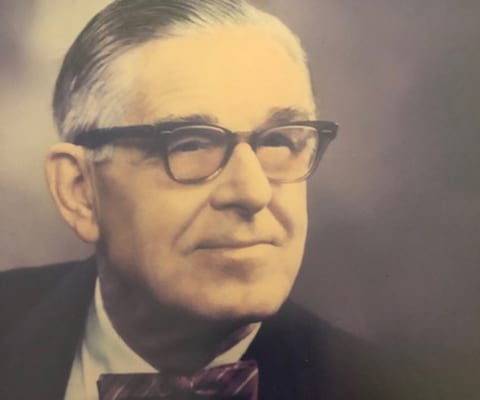Published on August 20, 2020

Pop, through the examples he set throughout his life, was always my most effective teacher. Helping him through his final days was not only my opportunity for payback but also a final lesson from my master teacher in life.
Despite the fact that we lived over 700 miles apart, Pop and I were always very close. When he expressed the desire to die at home after a terminal diagnosis, I knew I needed to be there to help. I was a doctor myself by this time, but still, the apprehension I had about taking care of him at home was palpable. My mother, a nurse for twenty years, was in poor health, and I had limited professional experience caring for my terminally ill patients in their home. Outside support services, such as Home Health and Hospice were not available in Baltimore at that time.
Mercifully, I was able to be with him at the home where I grew up, and there were no major medical issues that demanded more care that Mom and I could provide. He was able to pass away in his own bed next to my mother, and we both felt gratified that his wishes were granted.
Our perception that caring for Pop at home would be more stressful and difficult than allowing him to die in the hospital proved to be totally unfounded. Our visits with him in the hospital were always interrupted by frequent visits from health care workers and other hospital workers, and this created barriers to meaningful communication. Even though we lived close to the hospital, traffic and parking proved a challenge. Having him at home, where we were always close to him and able to communicate in a quiet, familiar environment was infinitely less stressful to all and facilitated closure.
The entire experience became the catalyst for me to care for as many of my own terminally ill patients at home as possible. I quickly appreciated, however, that providing effective end-of-life care demanded infinitely more time and effort than I was able to provide alone.
Quality care demands specialized knowledge and, more important, the necessary time to help patients and families navigate through the most difficult moments of their lives.
Fortunately, within a year after Pop’s death, Alive Hospice became operational. A few years earlier, a group of physicians, nurses, and dedicated members of the community had recognized the need. Their emphasis was on maximizing the quality of each day of a person’s life and treating dying as a natural part of the living process.
Their initial motto was “Friends for Life,” which conveyed the message that hospice care is designed for the living to provide care during a life limiting illness. In my own practice, I quickly appreciated that Alive’s services were exactly what were needed. They provided the clinical services and the emotional and spiritual care to assist patients and families through this challenging journey.
I quickly began to refer any patient in my practice with a life limiting illness to Alive, not only those with malignancies but people with severe functional decline, usually elderly, who did not wish to spend their final days in a hospital.
End-of-Life care and palliative care are now recognized as Board Certifiable specialties and are routinely taught in most medical school and residency programs. Like most disciplines, the knowledge, skills, and capabilities involved with hospice and palliative care have increased exponentially. We have so much more to offer!
Still, the basic premise remains; optimize every day of living! As a physician who referred many patients to Alive, a board member, and current volunteer, I’ve been privileged to witness the development of this movement and to contribute to our only non-profit hospice in Middle Tennessee. The community support Alive receives allows it to offer much more including financial support for patients and families.
My experience with my father’s death and then working with Alive has had a profound emotional effect on my life. The feelings of grief and relief when he passed, and, most important, the satisfaction of giving back to others at the end of life have remained with me to this day. Pop was the initial catalyst for my interest in end-of-life care, and he gave me something I could share with others- patients, colleagues, medical students, and residents in our training program.
I’m sure he did not have all this in mind when he got sick, but part of his legacy to me was giving me my life’s work and the legacy I will leave for others. I’m eternally thankful for the opportunity. Thanks, Pop!
